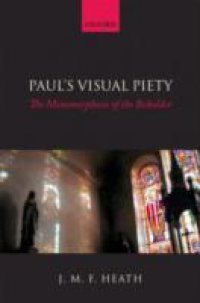This book is at the interface between Visual Studies and Biblical Studies. For several decades, scholars of visuality have been uncovering the significance of everyday visual practices, in the sense of learnt habits of viewing and the assumptions that underpin them. They have shown that these play a key role in forming and maintaining relationships in religious devotion and in social life. The Visual Studies movement brought issues such as these to the attentionof most humanities disciplines by the end of the twentieth century, but until very recently made little impact on Biblical Studies. The explanation for this disciplinary blind-spot lies partly in the reception of St Paul, who became Augustines inspiration for platonising denigration of thematerial world, and Luthers for faith through scripture alone. In the hands of more radical Reformers, the Word was soon vehemently opposed to the Image, an emphasis that was further fostered in the philologically-inclined university faculties where Biblical Studies developed. Yet Pauls piety is visual as well as verbal, even aside from his mystical visions. He envisages a contemplative focus on certain this-worldly sights as an integral part of believers metamorphosis into Christ-likeness. This theme runs through Romans, but finds its most concise expression in his correspondence with the Corinthians: We all, with unveiled face, beholding in a mirror the glory of the Lord, are being metamorphosed into the same image, from glory to glory, as from the Lord, theSpirit (2 Cor 3:18). Richly ambiguous and allegorical as this is, Paul shortly afterward defines an earthly site where this transformative, sacred gaze occurs. He insists that not mere death, but the death of Jesus is made manifest in his suffering apostolic flesh. Rightly perceived, thisbecomes a holy spectacle for the sacred gaze, working life in those who behold in faith, but undoing those who see but do not perceive.

